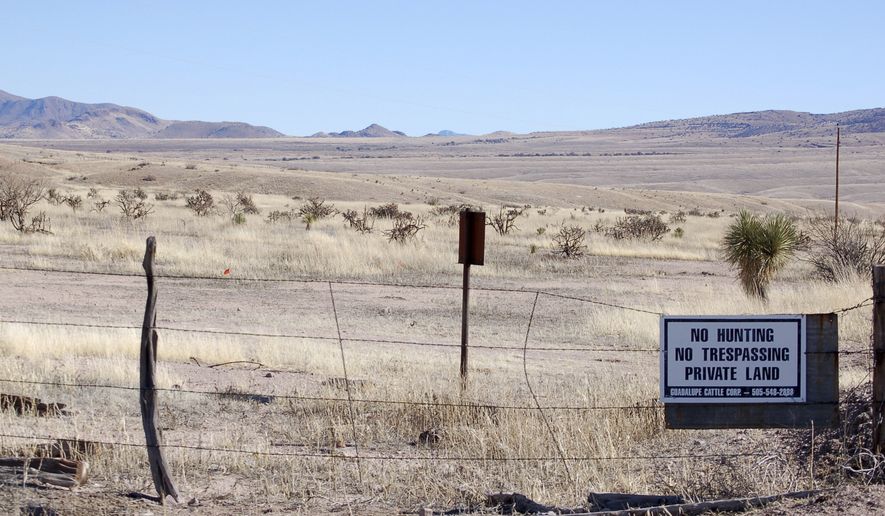Homeland Security officials said Friday that the father of the 7-year-old girl who died at the border last week had a number of chances to bring her condition to their attention, but waited hours before letting them know she was in trouble.
The Guatemalan girl would later die at a Texas hospital after suffering cardiac arrest and liver failure from what authorities say was the harsh journey through Mexico.
Her death after eight hours in U.S. Border Patrol custody has become the latest flashpoint in the ongoing debate about illegal immigration, with Democrats accusing agents of denying her water and blaming President Trump’s “cruel” policies.
But Homeland Security said she had access to water, agents did screen her and the 162 other illegal immigrants caught in a massive group for health issues, and said her father never told them about any problems until 5 a.m., or nearly eight hours after they were caught jumping the border in remote New Mexico.
“We gave immediate care,” Homeland Security Secretary Kirstjen Nielsen told Fox News in an interview Friday morning, defending her agents’ handling.
One immigrant-rights group identified the girl as Jackelin Caal.
Homeland Security’s inspector general said it has opened a probe into the girl’s death, and U.S. Customs and Border Protection’s personnel office is also investigating to see if procedures were followed.
According to a timeline provided by authorities, the group of 163 people were caught at 9:15 p.m. Dec. 6 at the Antelope Wells Port of Entry in remote New Mexico. The border crossing was shut down at that point, but the Border Patrol maintains a forward operating base there and they found the migrants.
Four agents were responsible for the group, and screened the 163 people, including the 7-year-old girl and her father. The father, interviewed by agents in Spanish, told them neither had any immediate health issues.
The port of entry is more than 90 miles by road from the Border Patrol station where migrants caught in that area are processed, and the station has only one bus, which was dispatched at 10 p.m.
The first group to board was 50 unaccompanied alien children — minors traveling without parents — who under court orders are the Border Patrol’s highest priority for care, absent other circumstances. The bus trip can take hours along remote country roads.
During that time the father and the girl were at a sally port at the border crossing, where they had access to water and bathrooms, a Customs and Border Protection official says. The official said the father did not raise any alarm about the girl.
The bus arrived back at the border for the second group at 4:30, and was about to depart again at 5 a.m. when the father first advised agents the girl was sick and vomiting. They were taken by bus back to the main processing station in Lordsburg, New Mexico, and just before a 6:30 a.m. arrival the father alerted agents on the bus that the girl wasn’t breathing.
Border Patrol agents revived the girl twice, officials said, and called local emergency services at 6:40. She was taken by air ambulance to an El Paso hospital where went into cardiac arrest, was revived, but had brain swelling and liver failure and ended up on a breathing machine. She died Dec. 8.
Sen. Dianne Feinstein, the top Democrat on the Senate Judiciary Committee, accused agents of maltreating the girl.
“It’s heartbreaking and unacceptable that a 7-year-old girl died of dehydration and shock last week in Customs and Border Protection custody,” she said. “Reports indicate that she was not given water for the eight hours she was in custody before seizures started, even though she’d had nothing to drink for days.”
Frank Sharry, executive director of America’s Voice, an advocacy group, called it a “preventable death” and blamed a “deliberately cruel and dehumanizing system.”
But Homeland Security officials said the father had every opportunity to alert them, both during an initial 20-question screening each migrant is given when first apprehended, or during the period when migrants were waiting for the bus to return, or again while the bus was taking them back.
“There were agents on the bus. the father could have brought this issue to their attention at any time,” the CBP official briefing reporters said. “There’s no indication it was lack of attention that resulted in this.”
He said the area is so remote that there’s no faster means of medical treatment than what happened.
“It’s very unfortunate in our line of work, but sometimes aliens do die in the desert. Sometimes our agents get killed in this process,” he said. “It’s a difficult, dangerous environment and the elements, the terrain itself make it all the more difficult.”
• Stephen Dinan can be reached at sdinan@washingtontimes.com.




Please read our comment policy before commenting.